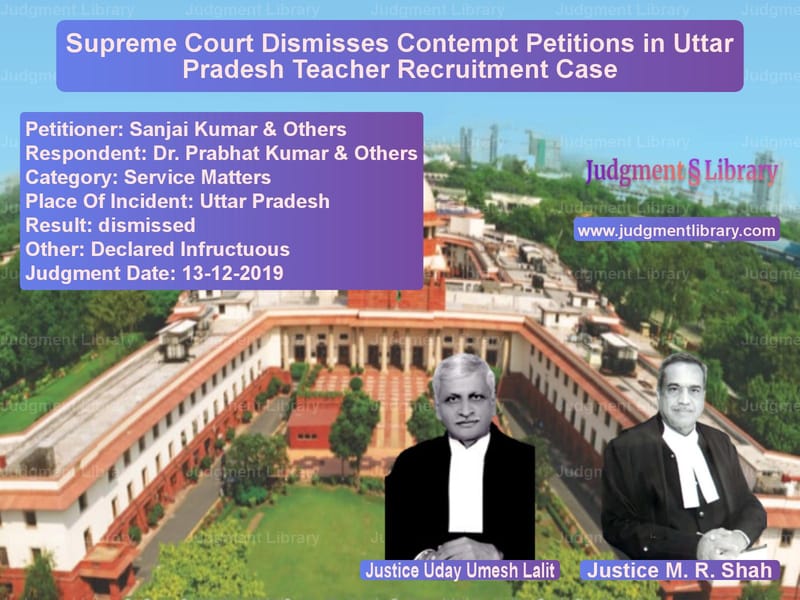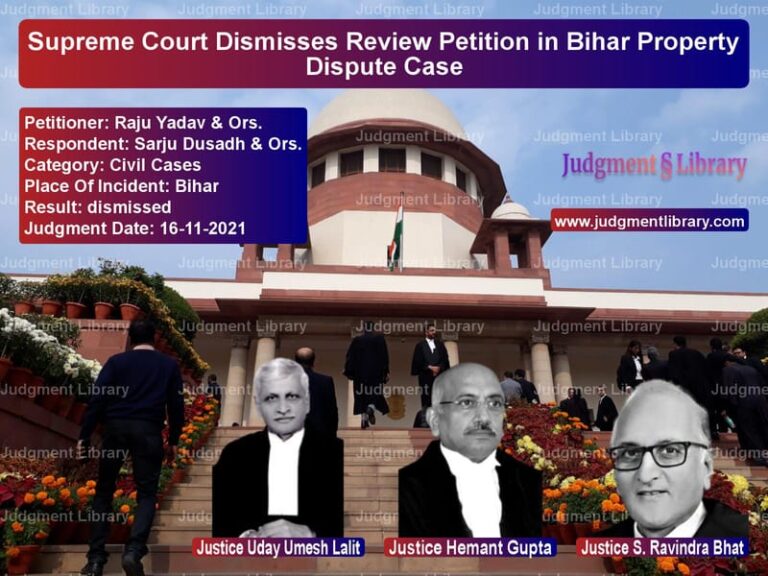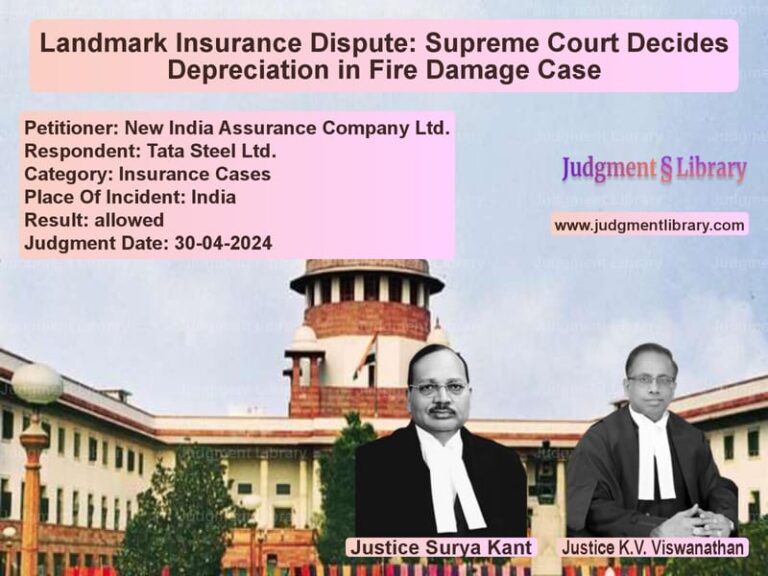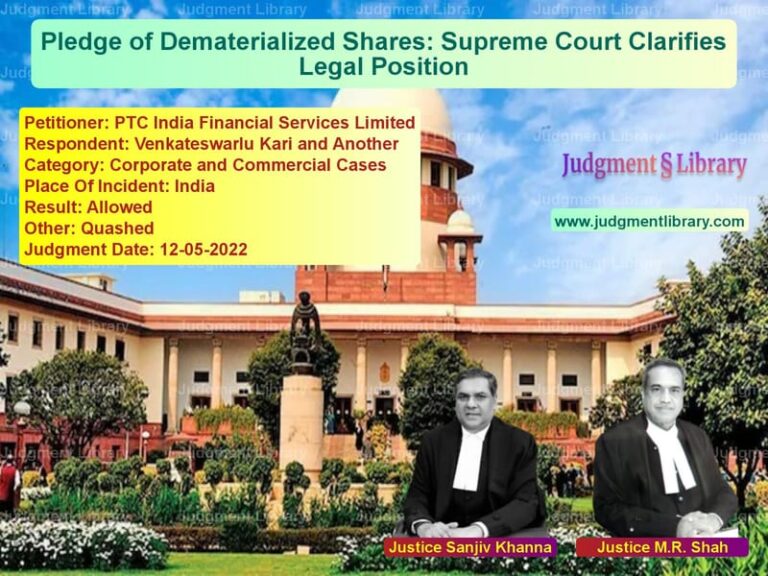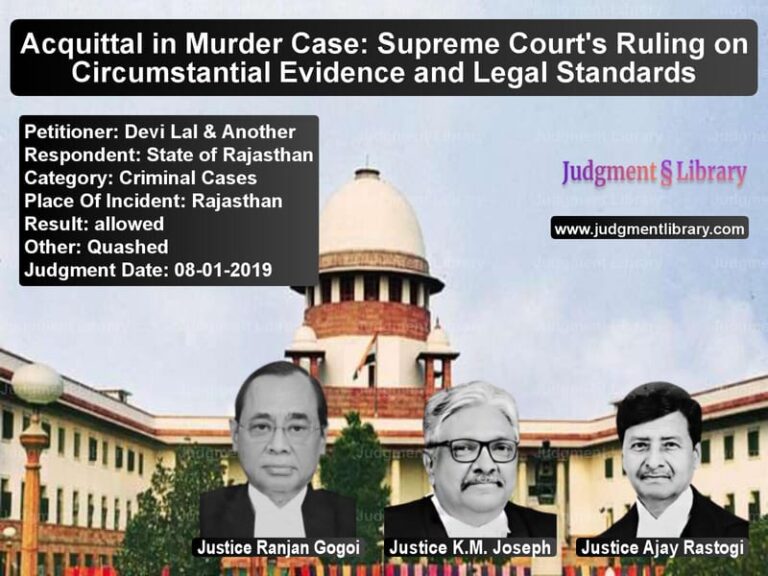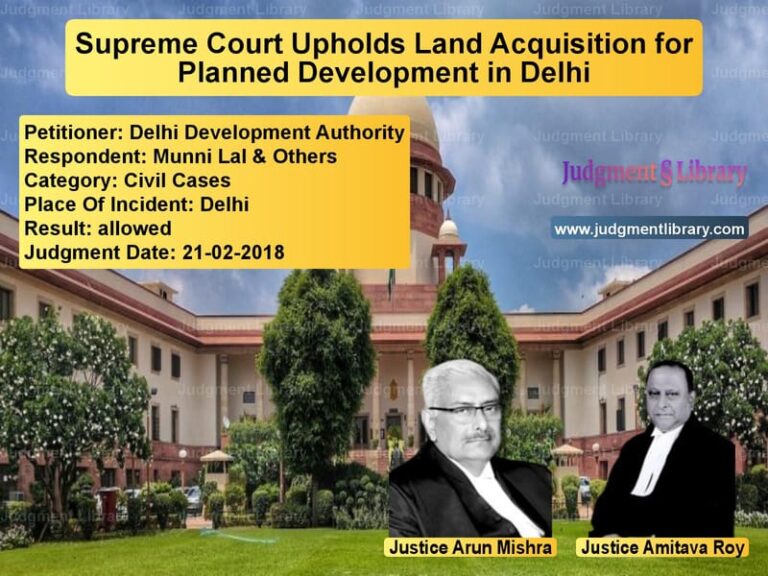Supreme Court Dismisses Contempt Petitions in Uttar Pradesh Teacher Recruitment Case
The case of Sanjai Kumar & Others v. Dr. Prabhat Kumar & Others is a significant judgment in Indian service law, particularly concerning government recruitment policies and compliance with court orders. This Supreme Court ruling involved a series of contempt petitions filed against the Uttar Pradesh government for allegedly failing to implement earlier judicial directives regarding the appointment of assistant teachers in primary schools.
The Court, after a detailed examination of facts and procedures, dismissed the contempt petitions, stating that the government had acted within legal bounds and adhered to previous orders. This case provides a crucial interpretation of the obligations of state authorities in recruitment processes and the legal thresholds required for contempt of court.
Background of the Case
The controversy stemmed from changes in teacher recruitment policies in Uttar Pradesh following the introduction of the Right to Education (RTE) Act. The National Council for Teacher Education (NCTE), designated as the academic authority under the Act, introduced the Teacher Eligibility Test (TET) as a qualifying criterion for teacher recruitment. The Uttar Pradesh government initially issued an advertisement for 72,825 trainee teacher posts in 2011 but later altered the selection criteria, leading to extensive litigation.
Several candidates who had applied for these positions challenged the revised selection criteria, arguing that the state’s actions were inconsistent with the binding guidelines issued by the NCTE. The matter was taken to the Supreme Court, which in 2017 ruled that the state government must proceed with recruitment while ensuring compliance with NCTE standards.
Key Legal Issues
The case involved several legal issues, including:
- Whether the Uttar Pradesh government had violated Supreme Court orders regarding recruitment.
- Whether the state’s modification of selection criteria after issuing the advertisement was lawful.
- The impact of interim court orders on the recruitment process.
- The scope of judicial review in contempt proceedings related to government recruitment.
Petitioners’ Arguments
The contempt petitioners, primarily consisting of teacher candidates, made the following claims:
- The state government did not appoint all candidates who had secured more than 70% marks in the General Category and 65% marks in the Reserved Category, as per the Supreme Court’s earlier directives.
- Despite the Supreme Court’s orders, the state manipulated the selection process, leading to wrongful exclusion of eligible candidates.
- The government provided incorrect data regarding the number of vacancies filled.
- Several candidates were unfairly denied appointment despite meeting all eligibility criteria.
- The government’s process was not transparent, and there were inconsistencies in its affidavits before the Court.
Respondents’ Arguments
The Uttar Pradesh government defended its actions with the following arguments:
- All Supreme Court orders had been duly followed, and appointments were made in compliance with prescribed guidelines.
- The 72,825 vacancies were filled according to merit, ensuring that only the most eligible candidates were selected.
- The petitioners were excluded not due to any manipulation but because they failed to meet the cut-off criteria in the districts they opted for.
- Two additional recruitment drives were conducted to ensure that all eligible candidates had opportunities to apply.
- No evidence of deliberate disobedience of court orders had been presented by the petitioners.
Supreme Court’s Analysis
The Supreme Court examined extensive records and found no basis to hold the state government in contempt. The Court reiterated that contempt proceedings require clear proof of willful disobedience of judicial orders, which was not established in this case.
The judgment stated:
“In the circumstances, we do not see anything wrong in the process undertaken by the State Government in pursuance of various interim orders passed by this Court and also in pursuance of the Judgment and final order dated 25.07.2017.”
Key Observations by the Supreme Court
The Court made several critical observations:
- Recruitment was conducted strictly according to merit-based selection criteria.
- The state had made substantial efforts to fill vacancies and ensure compliance with NCTE norms.
- The petitioners failed to prove that the government deliberately ignored court orders.
- Judicial review in contempt proceedings does not extend to reassessing factual findings unless there is clear evidence of non-compliance.
Legal Precedents Considered
The Court cited several precedents to clarify the legal threshold for contempt, including:
- State of Maharashtra v. Mahboob S. Allibhoy – Holding that contempt jurisdiction must be exercised sparingly and only in cases of willful disobedience.
- T.N. Godavarman Thirumulpad v. Ashok Khot – Stating that contempt should not be used as a tool to challenge government policies unless there is deliberate defiance of judicial orders.
- Re: C.S. Karnan – Affirming that the burden of proof in contempt cases lies with the petitioner.
Final Judgment
The Supreme Court dismissed the contempt petitions, concluding:
“We, therefore, see no reason to interfere in these contempt petitions, which are directed to be closed.”
With this ruling, the Court upheld the legality of the Uttar Pradesh government’s recruitment process and reaffirmed the principle that contempt cannot be used as a substitute for appeals or fresh litigation.
Impact of the Judgment
This ruling has several key implications:
- It strengthens the position of government authorities in executing recruitment policies within the bounds of law.
- It clarifies that judicial intervention in recruitment matters should be limited to cases of clear legal violations.
- It reinforces that contempt jurisdiction should not be misused for re-litigation of settled issues.
- It sets a precedent for future disputes concerning compliance with recruitment regulations.
Conclusion
The Supreme Court’s dismissal of the contempt petitions in Sanjai Kumar & Others v. Dr. Prabhat Kumar & Others reaffirms that government recruitment processes must be evaluated based on merit and compliance with established rules. The ruling emphasizes the importance of due process and legal finality in judicial decisions, ensuring that recruitment disputes are resolved efficiently without unnecessary litigation.
Petitioner Name: Sanjai Kumar & Others.Respondent Name: Dr. Prabhat Kumar & Others.Judgment By: Justice Uday Umesh Lalit, Justice M. R. Shah.Place Of Incident: Uttar Pradesh.Judgment Date: 13-12-2019.
Don’t miss out on the full details! Download the complete judgment in PDF format below and gain valuable insights instantly!
Download Judgment: Sanjai Kumar & Other vs Dr. Prabhat Kumar & Supreme Court of India Judgment Dated 13-12-2019.pdf
Direct Downlaod Judgment: Direct downlaod this Judgment
See all petitions in Recruitment Policies
See all petitions in Public Sector Employees
See all petitions in Employment Disputes
See all petitions in Judgment by Uday Umesh Lalit
See all petitions in Judgment by Mukeshkumar Rasikbhai Shah
See all petitions in dismissed
See all petitions in Declared Infructuous
See all petitions in supreme court of India judgments December 2019
See all petitions in 2019 judgments
See all posts in Service Matters Category
See all allowed petitions in Service Matters Category
See all Dismissed petitions in Service Matters Category
See all partially allowed petitions in Service Matters Category

